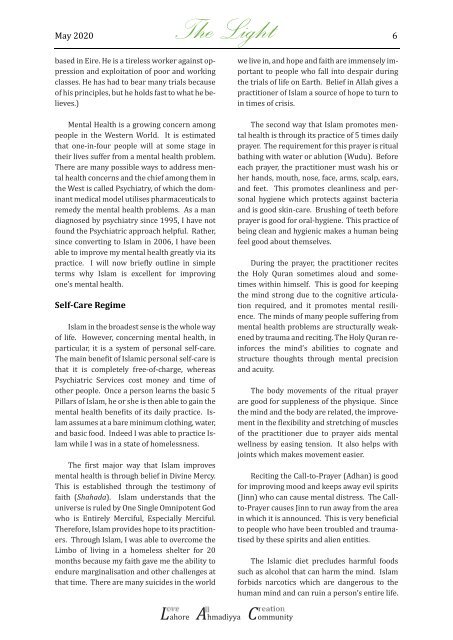The Light May 2020 05
Monthly magazine of the Lahore Ahmadiya Community. Presenting Islam as taught by the Holy Prophet Muhammad (s) - peaceful, loving, inclusive, rational, respectful, non-coercive.
Monthly magazine of the Lahore Ahmadiya Community. Presenting Islam as taught by the Holy Prophet Muhammad (s) - peaceful, loving, inclusive, rational, respectful, non-coercive.
You also want an ePaper? Increase the reach of your titles
YUMPU automatically turns print PDFs into web optimized ePapers that Google loves.
<strong>May</strong> <strong>2020</strong> <strong>The</strong><br />
<strong>Light</strong> 6<br />
based in Eire. He is a tireless worker against oppression<br />
and exploitation of poor and working<br />
classes. He has had to bear many trials because<br />
of his principles, but he holds fast to what he believes.)<br />
Mental Health is a growing concern among<br />
people in the Western World. It is estimated<br />
that one-in-four people will at some stage in<br />
their lives suffer from a mental health problem.<br />
<strong>The</strong>re are many possible ways to address mental<br />
health concerns and the chief among them in<br />
the West is called Psychiatry, of which the dominant<br />
medical model utilises pharmaceuticals to<br />
remedy the mental health problems. As a man<br />
diagnosed by psychiatry since 1995, I have not<br />
found the Psychiatric approach helpful. Rather,<br />
since converting to Islam in 2006, I have been<br />
able to improve my mental health greatly via its<br />
practice. I will now briefly outline in simple<br />
terms why Islam is excellent for improving<br />
one’s mental health.<br />
Self-Care Regime<br />
Islam in the broadest sense is the whole way<br />
of life. However, concerning mental health, in<br />
particular, it is a system of personal self-care.<br />
<strong>The</strong> main benefit of Islamic personal self-care is<br />
that it is completely free-of-charge, whereas<br />
Psychiatric Services cost money and time of<br />
other people. Once a person learns the basic 5<br />
Pillars of Islam, he or she is then able to gain the<br />
mental health benefits of its daily practice. Islam<br />
assumes at a bare minimum clothing, water,<br />
and basic food. Indeed I was able to practice Islam<br />
while I was in a state of homelessness.<br />
<strong>The</strong> first major way that Islam improves<br />
mental health is through belief in Divine Mercy.<br />
This is established through the testimony of<br />
faith (Shahada). Islam understands that the<br />
universe is ruled by One Single Omnipotent God<br />
who is Entirely Merciful, Especially Merciful.<br />
<strong>The</strong>refore, Islam provides hope to its practitioners.<br />
Through Islam, I was able to overcome the<br />
Limbo of living in a homeless shelter for 20<br />
months because my faith gave me the ability to<br />
endure marginalisation and other challenges at<br />
that time. <strong>The</strong>re are many suicides in the world<br />
we live in, and hope and faith are immensely important<br />
to people who fall into despair during<br />
the trials of life on Earth. Belief in Allah gives a<br />
practitioner of Islam a source of hope to turn to<br />
in times of crisis.<br />
<strong>The</strong> second way that Islam promotes mental<br />
health is through its practice of 5 times daily<br />
prayer. <strong>The</strong> requirement for this prayer is ritual<br />
bathing with water or ablution (Wudu). Before<br />
each prayer, the practitioner must wash his or<br />
her hands, mouth, nose, face, arms, scalp, ears,<br />
and feet. This promotes cleanliness and personal<br />
hygiene which protects against bacteria<br />
and is good skin-care. Brushing of teeth before<br />
prayer is good for oral-hygiene. This practice of<br />
being clean and hygienic makes a human being<br />
feel good about themselves.<br />
During the prayer, the practitioner recites<br />
the Holy Quran sometimes aloud and sometimes<br />
within himself. This is good for keeping<br />
the mind strong due to the cognitive articulation<br />
required, and it promotes mental resilience.<br />
<strong>The</strong> minds of many people suffering from<br />
mental health problems are structurally weakened<br />
by trauma and reciting. <strong>The</strong> Holy Quran reinforces<br />
the mind’s abilities to cognate and<br />
structure thoughts through mental precision<br />
and acuity.<br />
<strong>The</strong> body movements of the ritual prayer<br />
are good for suppleness of the physique. Since<br />
the mind and the body are related, the improvement<br />
in the flexibility and stretching of muscles<br />
of the practitioner due to prayer aids mental<br />
wellness by easing tension. It also helps with<br />
joints which makes movement easier.<br />
Reciting the Call-to-Prayer (Adhan) is good<br />
for improving mood and keeps away evil spirits<br />
(Jinn) who can cause mental distress. <strong>The</strong> Callto-Prayer<br />
causes Jinn to run away from the area<br />
in which it is announced. This is very beneficial<br />
to people who have been troubled and traumatised<br />
by these spirits and alien entities.<br />
<strong>The</strong> Islamic diet precludes harmful foods<br />
such as alcohol that can harm the mind. Islam<br />
forbids narcotics which are dangerous to the<br />
human mind and can ruin a person’s entire life.<br />
Lahore Ahmadiyya Community













